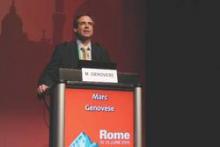ROME – Baricitinib, a novel biologic drug that selectively inhibits certain janus kinases, showed safety and efficacy for treatment of rheumatoid arthritis in a two separate, multicenter, phase III trials that together involved more than 1,200 adult patients.
One study showed baricitinib’s efficacy for rheumatoid arthritis (RA), compared with placebo, in patients previously treated unsuccessfully with at least one tumor necrosis factor (TNF) inhibitor, while the second trial showed similar outcomes in RA patients never before treated with a TNF inhibitor or with any other biologic drug.
“The safety looks acceptable, and the ACR [American College of Rheumatology] 20, 50, and 70 responses look like it will be effective. It looks like a very promising drug that will be another addition to our armamentarium,” Dr. João Fonseca, professor of rheumatology at the University of Lisbon, said at the European Congress of Rheumatology.
But the data so far did not seem to distinguish baricitinib from a similar Janus kinase inhibitor already on the market in Europe and the United States, tofacitinib (Xeljanz), said Dr. Roy Fleischmann, a Dallas-based rheumatologist. “I’m not sure baricitinib is different from tofacitinib in terms of its clinical effect,” he said in an interview, though he hedged that so far results have been reported from just two of the four phase III trials run to date using baricitinib.
Results in patients with prior TNF inhibitor experience
One of the trials, RA-BEACON, enrolled 527 patients with moderate or severe RA at 103 sites in 21 countries including the United States. Patients had to have been treated with at least one TNF inhibitor and could also have been previously treated with other biologic disease-modifying antirheumatic drugs (DMARDs) with either an inadequate response or intolerance to the treatment. More than half the patients had received treatment with at least two biologic DMARDS, and about a quarter had previously been on at least three. Average age of the enrolled patients was 56 years, about 80% were women, and the average duration of RA was 14 years.
The researchers randomized a third of enrolled patients to receive 2 mg of oral baricitinib once daily, a third received 4 mg baricitinib once daily, and a third received placebo. The study’s primary end point was the percentage of patients who achieved an ACR20 response after 12 weeks of treatment, but patients remained on treatment for 24 weeks.
The primary endpoint occurred in 27% of patients on placebo, 49% of those on the 2-mg dose, and 55% of those on the 4-mg dose, statistically significant differences between placebo and each of the active-treatment arms, said Dr. Mark C. Genovese, professor of immunology and rheumatology at Stanford (Calif.) University. Increased ACR20 responses associated with baricitinib treatment first became discernible, compared with placebo, after 1 week on treatment, and after 4 weeks of treatment the impact of baricitinib treatment began to plateau, Dr. Genovese reported.
A notable secondary endpoint was the incidence of remission as measured by the percentage of patients achieving a disease activity score in 28 joints (DAS28) of less than 2.6. When calculated via C-reactive protein levels, remission occurred in 22% of patients after 24 weeks on the 4-mg daily dosage, compared with 6% of placebo patients. DAS28 calculations that used erythrocyte sedimentation rate showed that the rate of remission after 24 weeks among patients on the higher baricitinib dosage reached 9%, compared with a 3% rate among placebo patients.
The safety and tolerability of baricitinib appeared “satisfactory,” Dr. Genovese said. After 24 weeks, patients on the higher dosage had a 10% rate of serious adverse events, compared with a 7% rate in the placebo patients. The overall rate of serious infections was identical in the 4-mg/day group and the placebo patients; herpes zoster occurred in 4% of patients on the higher dosage after 24 weeks, compared with a 1% rate in the placebo group. The rate of grades 1 and 2 neutropenia were also somewhat elevated in patients on the higher dosage after 24 weeks, with a 7% rate of grade 1 neutropenia and a 4% rate of grade 2.
Results in patients without biologic DMARD experience
The RA-BUILD trial had a design very similar to that of RA-BEACON except it exclusively enrolled patients with no prior treatment with any biologic DMARD. The study enrolled 684 patients at 147 centers in 22 countries including the United States. The primary endpoint of the study, the rate of ACR20 responders after 12 weeks on treatment, occurred in 66% of patients randomized to receive 2 mg oral baricitinib daily, 62% of patients receiving 4 mg daily, and 40% of patients on placebo, reported Dr. Maxime Dougados, professor and chief of rheumatology at Cochin Hospital in Paris. The differences between each of the active-treatment groups and the control group were statistically significant.




